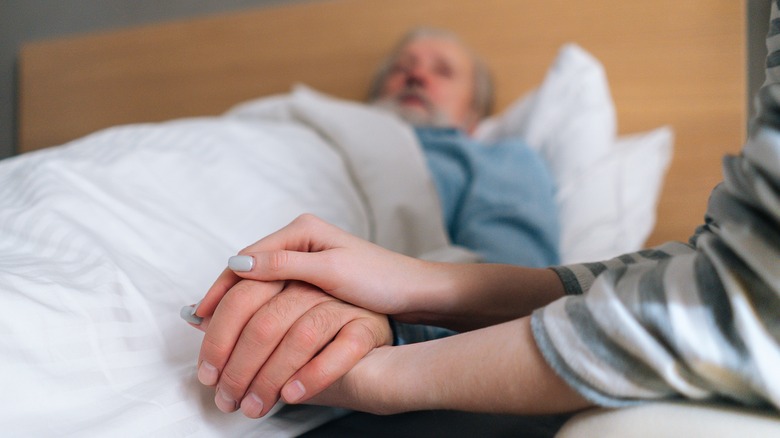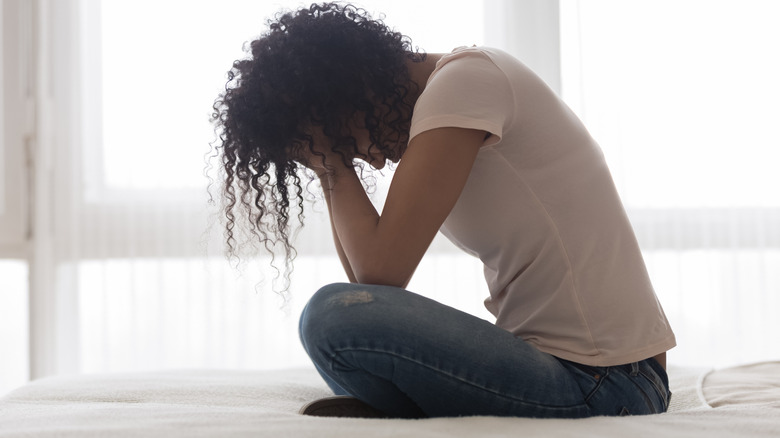How To Prepare For The Impending Loss Of A Loved One
One of the few things that can make losing a loved one even harder is anticipatory grief. This is the grief that's experienced when your loved one is still alive, but the end is near. It's a waiting game on the inevitable, and the toll it takes can be debilitating. It's a complicated grief that's tied up with the fear of losing them, as well as the knowledge that when they do pass, there will be a sense of relief, something that can make people feel guilty.
"Anticipatory grief starts as soon as your loved one's life is put into question," bereavement counselor and founder of Grief Specialists, Maria Bailey told Refinery 29. "When you know your loved one is going to die, it's like death by inches — you start losing little pieces of them, rather than the whole of them at once."
There's no easy way to lose someone we love and there's certainly no right or wrong way to grieve. But setting time aside to deal with grief and taking steps to prepare yourself for the impending loss can help you navigate those emotions that will become all too real once they pass away. Preparation won't erase the pain, but it will ease a bit of the emotional toll. It's this easing that will help you get through this process.
Acknowledge your grief
You are grieving. Accept it. Don't try to ignore it, don't try to outrun it, don't try to suppress it. Grief can manifest in many ways. It can result in anger, guilt, sadness, anxiety, confusion, and even joy. These emotions can be felt at any time during your grieving process and you should lean into them and feel them. If you're angry, let yourself punch a pillow. If you're sad, cry your eyes out until it feels like you have nothing else. If you feel joy (yes, joy), embrace it as a momentary relief from the more complicated feelings that come with grief.
Grief doesn't go away. It's a human experience that must be felt in order to move forward. Putting it on a shelf won't get rid of it. Instead, you're just putting off something that is a necessary part of loving and losing. Every loss requires a grieving period. So embrace your emotional vulnerability – let yourself grieve now and let yourself grieve when they're gone. This is a must for your mental, emotional, and physical health. Acknowledge that you're grieving and expect the unexpected in regard to how you internally process your grief. That's really the best thing you can do for yourself during this difficult time in your life.
Surround yourself with support
According to a 2020 study published in Omega, people who are experiencing anticipatory grief have an easier time proactively coping and growing from the experience due to social support. That support can come from friends and family, or from the outside, like a therapist or grief counselor. Hanging with your friends and loved ones is good for the soul, and when you're surrounded by people who validate your feelings and tell you it's okay to feel as you're feeling, it can provide a safety net to just feel, feel, feel — and that's what you need to do.
"What we see in science is, if you have a grief experience and you have support so that you have a little bit of time to learn, and confidence from the people around you, that you will in fact adapt," clinical psychologist Mary-Frances O'Connor told NPR. Adapting is the key here. You won't get over the loss, nor are you expected to. What you will end up doing is moving forward and adapting. The hole that a loved one leaves in their passing never goes away and it can't be filled. You just learn to steer your way around that hole and try not to fall in.
Be kind to yourself
Taking care of yourself can help in overcoming the physical toll of anxiety and depression that can often accompany anticipatory grief. As much as you're struggling, you need to be kind to yourself. You need to take a break when you feel it, eat when you're hungry, sleep when you're tired, and cry when you need to cry. You're not only doing this for your physical and mental well-being, you're doing it for your loved one as well.
"You have to put your own [oxygen] mask on first," licensed psychologist Mekel Harris told The Washington Post. "Anticipating a loss of a family member is exhausting mentally, physically, and spiritually. If you're exhausted, it makes it difficult to be present for the moments that you do have with your loved one."
During this challenging time, the last thing you want to do is miss out on these final moments together. You don't want to run yourself sick when you could be making lasting memories. As much as you're suffering and trying to juggle complicated emotions like obligation, guilt, fear, and more, take a step back and check in with yourself. Ask yourself how you're doing — really doing — and where you can make tweaks in your current situation to feel better. It's important to keep yourself strong and healthy so you can handle not only what's happening now, but the emotions that will come after your loved one passes away.
Avoid unhealthy coping mechanisms
When faced with an impending loss, some people turn to things that will numb or at least dull the pain. That can be drinking, drugs, spending exorbitant amounts of money, and similar behavior that feels good in the moment but is toxic more than anything else. You can't wallow in a haze forever. Eventually, you have to come up for air and face the reality of the situation.
"As humans, we often choose the path of least resistance by ignoring the cues designed by our bodies and minds to help us learn from our history and each other," Paula Pavlova of Pavlova Wellness told Real Simple. "We use substances like drugs, food, and alcohol to drown our worries, pick little fights to avoid feeling our feelings, point out others' flaws and hold grudges instead of looking closely at ourselves... These tactics are attractive because they're easy — but they work until they don't."
You also run the risk of these coping mechanisms becoming dependencies. When that happens, you're going to turn to these toxic behaviors every time you suffer a blow that you feel you can't manage on your own. A glass of wine after an emotional day? Sure. The whole bottle? Put it away; it will be there tomorrow.
Know there's no right way to grieve
Many of us have been taught that there are five stages of grief and that when we go through those stages, we'll be on the other side of the pain. If only it were that easy. According to a 2018 study published in the Journal de Thérapie Comportementale et Cognitive, these stages don't exist. The research found that strong yearning was the only emotional state linked to grieving, and the theory that grief stages are experienced in a certain order was untrue. While it would be nice to wrap up things into perfect little boxes, the human condition doesn't work like that. There is no step-by-step grieving process because there is no one way to grieve.
If you grieve for months, so be it. If you grieve for years, then that's what you'll do. When it comes to grief, we're here without a compass and we just have to go with it. Where it takes us, emotionally and mentally, is anyone's guess — which is ultimately a good thing. If grief fell into specific stages, we'd all be running around with a checklist, which probably wouldn't help the situation. So go with Rilke when it comes to grieving: "Let everything happen to you: beauty and terror. Just keep going. No feeling is final." You will get to the other side eventually. No matter how you get through or how long it takes you, don't sweat it; that's your journey.





